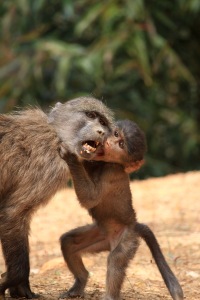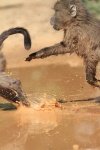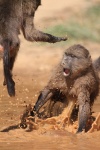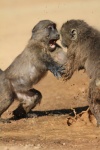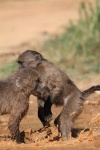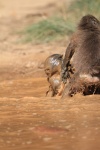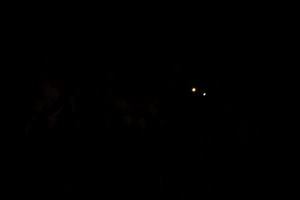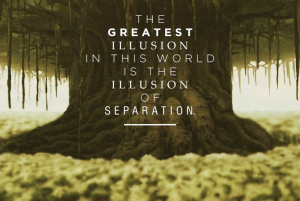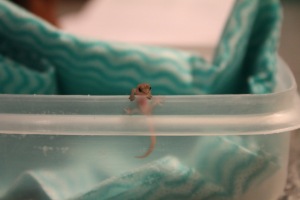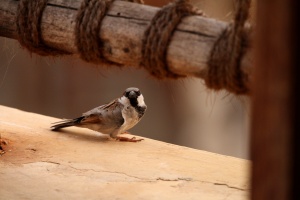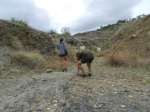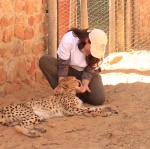The IUCN – International Union for Conservation of Nature is meeting in Hawaii as I type this. The conference is bursting with people who can and do make the laws about how we treat our brethren species of animals. Poaching and the issues of illegal wildlife trade are at the top of their list of topics to tackle. And I don’t envy a single one of them, as there are no perfect answers, and everything they come up with as solutions will be scrutinised and fought over by some faction who isn’t pleased with their decisions. But there ARE answers to be had. It will be interesting to see what comes out of the convention, as well as what comes out of CITES’ CoP 17, taking place in South Africa in mid-September.
I am sure people are tired of hearing about the poaching problem. And hey, I’m tired of hearing about it too. I’m tired of getting paid peanuts to fight to protect wildlife and wild places for a world that collectively doesn’t seem to care enough to do anything to help the situation. I’m tired of being asked to educate people who seem to not want to listen. I’m tired of seeing butchered rhinos and elephants, selfies taken with abused animals or that put animals at risk (or worse, cause their actual death), and 12-year-olds beaming as they pose next to some big game they’ve ‘bagged’ for sport. I’m tired of it all because, to be honest, it often feels like a losing battle. If I had even a penny for every person I’ve met who says that humans are more important than any of the other animals in the animal kingdom and that the sole purpose of every other species is for human benefit – our consumption and enjoyment – I’d quite possibly oust a billionaire or two from Forbes’ coveted Wealthiest People list.
However, despite the frustration, I continue to not just sit back. I do something. Or at least I am trying to do something. Are you?
Often I’ve found that the same people who complain about poaching and the illegal wildlife trade also haven’t done anything to help solve the problem. I know this isn’t always the case with every person, but more often than not I’ve found it is. Like it or not, that’s been my experience so far. So many people complain about the situation and ask how they, a single person, can possibly make a measurable impact. And each time they ask me, I give them reams of information about how every bit counts, how they CAN help, and enough positive reinforcement to hype up a small army. Sometimes I feel like the Tony Robbins for wildlife protection. Except he gets paid a lot more. And people listen to him. They don’t seem to listen to me.
Most times I get angry, because many of the same people who ask for suggestions and who insist that they are going to get involved, don’t. Or worse, they go ahead and do the things I’ve said CAUSE the problems (such as taking selfies with captive lion or tiger cubs at pretend conservation sanctuaries, riding elephants, or eating shark fin soup). Then they wonder why I stop talking to them.
It’s a shame, not because I stop talking to them (I doubt they really care since they clearly don’t care enough about me to listen to my expertise, advice, and suggestions). It’s a shame because the ill effects of poaching and the illegal wildlife trade aren’t contained in a handful of people in a handful of countries. Nope, they affect EVERY ONE OF US, everywhere.
It has been proven many times over that the funding from poaching is funnelled into any number of criminal organisations and actions, from illegal drug trafficking, human and wildlife trafficking, and terrorism groups (Boko Haram, anyone?). And still, billions of people are sitting back and doing nothing about it.
Here’s what I want to know. People were more than willing to dump a bucket of ice over their head, pledge money to a cause that only affects a very small proportion of the population (and no, I am not diminishing this cause or the disease, but I am playing devil’s advocate for a moment, for perspective and for argument’s sake), and pass it on to a bunch of other people, who happily did the same. And on and on and on. The ice bucket challenge raised millions of dollars to help what is actually a minuscule proportion of the population.
Rhino poaching, on the other hand, affects BILLIONS of people. It affects – whether directly or indirectly – every human on this planet. So why the different response? Why the lack of participation? Is it because the face of it isn’t a human’s? Do we just not care so much when it’s another species in the animal kingdom? Or is it the belief that it’s not in my back yard, so it isn’t my problem? Well, if nothing else, this post should have opened any reader’s eyes to the fact that it IS in your backyard. It’s in everyone’s backyard.
Forget the millions of people in Africa who will suffer because the tourism industry will suffer a massive blow from the extinction of the rhino. Not to mention the imminent demise of other iconic species like and the lion and the elephant – we’re getting awfully close, people – the population of elephants decreased 30% in the last 7 years alone. Then there are the smaller, lesser-known species – pangolins come to mind – that suffer as a result of the inefficiencies, loopholes and lack of sufficient attention directed at this problem. The cracks are wide and deep, and we aren’t doing enough to seal them up and prevent further cracks from appearing.
Who wants to see the Big 4? Or, and what is becoming highly likely, the Big 2? If poaching continues, it won’t just be biodiversity and habit that will be affected adversely. Poaching affects animals AND people, and on a massive scale. Economies will suffer on the African continent, which will obviously not just cause suffering for the people who work in the tourism industry; entire countries overall will bear the brunt. And let’s not forget the fact that people are also dying in myriad ways as a result of this trade, whether directly – as rangers fighting against poachers or as poachers being killed in action – or indirectly – as victims of terrorist attacks, corrupt regimes, and genocide.
It has been well proven that drug trafficking, human and wildlife trafficking, and terrorist groups receive funding by poaching and the illegal wildlife trade syndicates behind it. MILLIONS UPON MILLIONS OF DOLLARS from the death of wildlife go into the hands of violent militant groups and drug cartels around the world!
So are you paying attention now? Are you perhaps now considering that it’s time to do something about this?
I work in conservation in South Africa. I see this stuff first hand. And it has two contradictory effects on me. One effect is to hate the human race, feeling nothing but disgust for anyone who can do what these people do to another living creature.
The other is to treasure that same human race because I see the people on the ground working their tails off to save these and so many other creatures. They aren’t just saving a bunch of big grey tonnes of mammal with a few pointy parts on their face. They are saving economies, people’s livelihoods, biodiversity…the list goes on and on. People are risking their lives EVERY SINGLE DAY, putting themselves in the literal line of fire to not just keep these animals alive, but to combat the trade across the board. And they are doing so with limited support and even more limited resources. And you can help them! Yes, YOU!
Everyone everywhere in the world can help to fight the poaching problem. There are plenty of honest and trustworthy organisations that are channelling the money they receive into rhino (and ultimately wildlife) conservation, community outreach and betterment programmes, as well as for education campaigns for the cultures who are selling and buying the horn. WildAID is a perfect example.
The MyPlanet Rhino Fund is another example. They are affiliated with the Endangered Wildlife Trust (EWT), which is a highly reputable organisation in the conservation industry (and in indeed any industry). You can donate directly or, if you are South African, you can get yourself a MyPlanet card, designate the MyPlanet Rhino Fund as your beneficiary, and voila! It costs nothing to sign up for the card and you pay nothing to have it. But a percentage of every Rand you spend gets put into a fund that is allocated to worthy rhino poaching initiatives. I speak from experience with these guys. I’ve been in meetings with them when they decide where the funding is going. And it DOES go to the causes, not the pockets.
But it isn’t just about donating money. It’s about donating your time and using your actual voice. Volunteer for an organisation like the World Wildlife Fund, or the Nature Conservancy. Hold your own fundraisers at schools, offices, whatever. Walk the walk. Petition your government to get involved. And, for the love of all that is good in this world, don’t buy products made with rhino horn (or from ivory, or pangolin scales, or bear bile, or lion skins, etc.). The more voices putting pressure on the countries where this is happening, the more those countries have no choice but to take this problem seriously and do something (or many things) significant about it.
Here is one such challenge that can be changed, provided there is enough dissent to force that change. In South Africa, anti-poaching units are not allowed to engage the poachers unless fired upon. Which means that even if these units find poachers, they can’t do much. They can try to arrest the poachers, but obviously, a poacher is not going to rock up, put out their hands and let someone put them in cuffs. They are armed, they are dangerous, and they are there for one purpose – to get the horn – and they will (and do) kill anyone or anything that gets in their way. We need to call upon the South African government to change the rules of engagement. There also need to be stronger and more seriously enforced laws surrounding wildlife crime. Right now those laws are a joke and the likelihood of them being upheld even more of a laugh. The government needs to take environmental crime seriously. They need to step up to the plate and take care of their country’s natural resources, its biodiversity, its economy and its people. But this isn’t just happening in South Africa. All governments everywhere should be taking notice and taking action.
Don’t fool yourself into thinking that because you don’t live on the front lines in Africa and Asia that your country isn’t complicit in what’s going on – the US and Europe are among the many places contributing significantly to the decimation of wildlife, through outlets like trophy hunting, illegal trafficking, land clearing, or even traveling to places overseas and visiting petting zoos that cater towards exotics. Petting a lion cub or taking a walk with one is never conservation (check out Blood Lions if you don’t want to believe me). Cuddling a loris on the streets of Southeast Asia does not help wildlife (and certainly not the loris, who’s had his teeth ripped out just for the occasion). These are all examples of scams and greedy practices that bring in money that goes solely into the pockets of the people benefiting from keeping and breeding captive animals, animals that are often stolen from the wild and that will never be released (nor could possibly be safely released, after so much human interaction) into the wild. Ordering shark fin soup is not something you should do, ever. Just don’t.
Know people in Asia? Here’s another avenue to try. By spreading the word that rhino horn, pangolin scales, elephant tusks, tiger/lion penis/bones have NO MEDICINAL VALUE and they are ILLEGAL to buy, you can help educate people in the countries mainly responsible for the demand. And be sure to tell them it’s not cool to buy those products either since a huge part of the market in many countries isn’t actually traditional medicine, but ego and status. Feel free to share a photo of a poached rhino with them, so they can see how their ignorance/greed/’whatever it is compelling them to buy or sell illegal products’ is leading to this disgusting massacre of life.
People keep bringing up legalising trade. Study after study has shown that not only will legalising trade not help, but given the amount of time it will take to change the laws that allow trade, there will be no rhino left if it ever gets legalised. Let’s not forget the ethical side of trade as well. Or the sociological one. Or the environmental one. Farming rhino is not a walk in the park, nor is it good for the environment or the rhino. In fact, the only things it benefits are the owner selling it to the middle man, and the middle man selling it to the buyer.
Rhino must be knocked out with anesthesia every time you want to cut off their horn. Every time. Not only is this not good for the animal in general, continued activity such as dehorning causes behavioural changes, stresses the animal out and leaves it more susceptible to disease. It also means the rhino has no horn to defend itself. That, in turn, can affect the wild populations. Disease can knock out an entire crash of privately owned rhino. And then who will meet the demand? Sorry, folks. We gotta go back to poaching because there’s not enough rhino horn available legally.
As more people can GET rhino, more people WANT rhino. And that’s a whole other black hole. The DEMAND side has to change, whether we legalise it or not. Because we will NEVER be able to keep up with the demand. The elephants are a great example. We never bothered to deal with the demand side. We legalised ivory sales again. And elephant poaching went wildly out of control (and continues to spiral downward at an uncontrollable rate).
Today, I am asking you to start your own challenge. Like with the Ice Bucket Challenge, I ask YOU to spread the word about rhino poaching and the illegal wildlife trade. Get people to get involved in the fight. Take a photo of yourself doing your best rhino impression, tag it with “#SaveOurRhino” and upload it to every social media account you have. And, and this is one of the most important parts, TAG OTHER PEOPLE and ask them to do the same. And then physically get involved.
Combatting illegal wildlife trafficking is going to take the help of people all over the world. You aren’t just saving an amazing animal (and by default, if we curb poaching, we are in fact saving MANY species of animals). You are saving millions of people’s jobs and the economies of entire countries; you are fighting terrorism and the illegal drug/human/wildlife trafficking trade; you are doing your part to sustain the planet and its incredible biodiversity. If there isn’t a worthier cause than that, I’d love to know what it is.
Please help. Share this post. Get involved. DO SOMETHING!
Video: Critically Endangered Black Rhino Calf Hit the Ground Running Hoedspruit’s young orphan rhino, Gertjie
I know many people have never had the fortune to see these animals in the flesh, except for maybe in a zoo (and speaking from experience, I can tell you it isn’t the same thing as seeing them in the wild). But if you’ve never seen a baby rhino, please watch the video above. It will melt your heart. And maybe it will further convince you to get involved.
While I am using a happy video rather than a brutal and violent poaching one, I’m doing so for no one’s benefit but my own. I’m tired of seeing massacred rhino, so for my own sake, I want to share something positive. But I am not promising anything for the future. I do believe that if you shield your eyes from the truth, you’ll never acknowledge it. So be warned that an ugly, heartbreaking one will likely surface at some point if that’s what it takes to get people to get off their butts and actively involved in fighting this war on wildlife (and on ourselves).
That’s today’s buzz from the bush.
All rights reserved. ©2015 Jennifer Vitanzo
 Here’s a little update on what else has been going on, since I know I have been silent for quite some time now. In addition to finishing the book and promoting it through podcasts, school and library visits, and teaching workshops based on it, my life lately has also been dedicated to writing and recording new music, teaching photography and creativity workshops, starting up a podcast (Nature Knows), learning how to edit videos, and running online events. It’s amazing how many iterations a life can take.
Here’s a little update on what else has been going on, since I know I have been silent for quite some time now. In addition to finishing the book and promoting it through podcasts, school and library visits, and teaching workshops based on it, my life lately has also been dedicated to writing and recording new music, teaching photography and creativity workshops, starting up a podcast (Nature Knows), learning how to edit videos, and running online events. It’s amazing how many iterations a life can take. 











